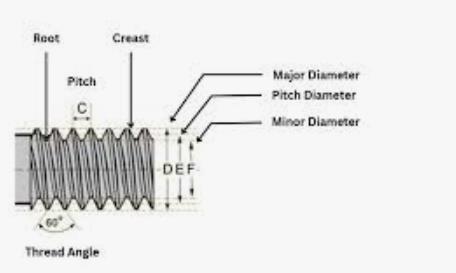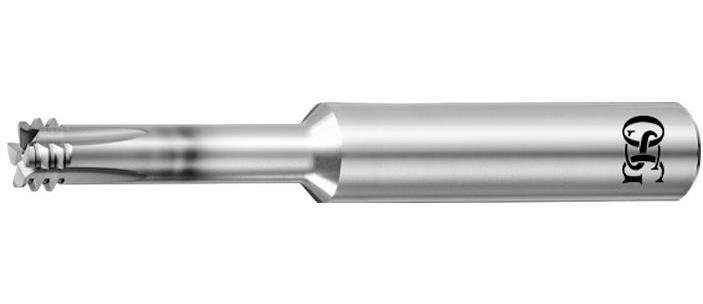Real-World Problem Solving: When tapping tools snap in tough materials like titanium or struggle to handle fine threads like 4"-80 UNJ, thread milling becomes the solution. Industry reports reveal the following benefits of thread milling:
- 47% longer tool life in Inconel compared to tapping (MachiningCloud 2023 report)
- 30% cost reduction on holes larger than 1" diameter (Boeing SAE case study)
2. The Physics Behind Thread Milling
Core Innovation: Thread milling uses a smaller tool diameter compared to tapping, enabling it to cut threads in larger holes with enhanced precision.
Helical Interpolation: The tool moves simultaneously in both a circular (X/Y) and axial (Z) motion, creating threads with superior geometry.
Chip-Load Advantage: Thread milling generates 70% less cutting force than conventional tapping, making it ideal for hard-to-machine materials and reducing tool wear.
Tool Path Visualization:

3. Thread Mill Selection Matrix (Global Standards)
Selecting the right thread mill depends on the material, thread requirements, and machining conditions. Below is a helpful guide:
| Tool Type | Best For | Speed/Feed Tips | Top Brands |
|---|---|---|---|
| Straight Flute | Soft alloys, prototyping | 300-500 SFM, 0.003″/tooth | Kennametal |
| Helical Flute | Stainless, aerospace | 150-250 SFM, 0.002″/tooth | Sandvik Coromant |
| Single-Point | Hardened steels (>45 HRC) | 80-120 SFM, 0.001″/tooth | Iscar |
NASA-Approved Practice: For A286 superalloy fasteners, use variable-helix tools with AlTiCrN coating (Ref: MSFC-STD-3676)
4. When to Choose Thread Milling vs. Tapping
Dominate These 5 Scenarios with Thread Milling:
- Large Diameters: Thread M120 holes on horizontal mills.
- Blind Holes: Perfect threads to the bottom with controlled retract.
- Interrupted Cuts: Reliably thread cast iron with sand inclusions.
- Exotic Materials: Hastelloy, Waspaloy, and GRCop-42 copper alloys.
- Custom Threads: Produce UNJ, ACME, and NPT in the same setup.
Avoid Thread Milling When:
- Mass-producing M8×1.25 threads in 6061-T6 aluminum.
- Limited CNC interpolation capability.
- Shop only has manual machines.
5. Global Machining Parameters Cheat Sheet
| Material | SFM | IPT | DOC | Coolant Strategy |
|---|---|---|---|---|
| 7075-T6 Aluminum | 650 | 0.004″ | 1.5×Pitch | Air blast + MQL |
| 17-4PH Stainless | 180 | 0.0025″ | 1×Pitch | 8% Emulsion @ 800 psi |
| Ti-6Al-4V ELI | 110 | 0.0015″ | 0.8×Pitch | Through-tool cryo |
| D2 Tool Steel | 75 | 0.001″ | 0.5×Pitch | Dry machining |
Euro-Specific Tip: For CE-compliant shops, use minimum quantity lubrication (MQL) when machining copper alloys (per EU Directive 2023/178).
6. Advanced Troubleshooting Guide
| Symptom | Root Cause | Fix | Prevention |
|---|---|---|---|
| Thread chatter | Excessive tool overhang | Reduce L:D ratio below 4:1 | Use hydraulic expansion holder |
| Dimensional drift | Thermal expansion | Implement compensation +0.0003″/inch | Pre-cool workpiece |
| Poor surface finish | Chip recutting | Program full retract every 3 threads | Use compressed air blast |
| Tool fracture | Incorrect helix direction | Verify climb vs. conventional milling | Run spindle verification test |
7. Programming Pro Tips (Fanuc/Heidenhain/Siemens)
G-Code Essentials for Thread Milling:
G17 G90 G54 ; XY plane, absolute, work offset
G43 H01 Z1.0 ; Tool length comp
M03 S3500 ; Start spindle
G02 X0 Y0 I-0.5 Z-0.1 F20.0 ; Helical interpolation
; Repeat for thread depth (Z-increment = pitch)
G00 Z2.0 M05 ; Retract, stop spindle
CAM Software Settings:
- 85% radial engagement maximum
- Lead-in/lead-out ≥ 30° arc
- Always use centerline programming
8. 2024 Industry Innovations
- Smart Tooling: Kennametal’s NOVO chipbreaker technology reduces torque by 40%.
- Hybrid Processing: DMG MORI’s MillTap machines combine drilling and threading for faster setups.
- AI Optimization: Siemens NX Thread Advisor auto-generates cycle times, optimizing efficiency.
- Ultra-Precision: Sandvik’s CoroMill® 390 achieves Ra 0.8 μm finish in titanium.
9. Machinist’s FAQ (Field-Tested Answers)
- Q: Can I thread mill left-hand threads?
A: Yes, simply reverse the spindle rotation (M04) and adjust the helix direction (G03 for RH → G02 for LH). - Q: What’s the minimum hole size?
A: Commercially available tools can handle holes as small as #0-80 (0.060″/1.52mm) using micro-grain carbide tools. - Q: How to calculate cycle time?
A: Formula: Time = [(Depth ÷ Pitch) + 2] × (π × Hole Dia ÷ Feed Rate) + rapid moves. - Q: What are OSHA coolant requirements?
A: Use NSF-registered fluids with ≤0.5 mg/m³ aerosol exposure (29 CFR 1910.1000).
10. Partner Selection Criteria
When selecting a machining partner for mission-critical threads, prioritize the following certifications:
- AS9100 Rev D aerospace quality systems
- Nadcap AC7114 special process approval
- On-site CMM with Geomagic® Control X
“Demand these certifications for guaranteed thread quality and reliability.” – J. Richardson, Former SpaceX Manufacturing Lead
▼ Get Instant Thread Milling Solutions
Upload your drawing to receive a comprehensive DFM analysis within 3 hours:
- Material-specific tooling recommendations
- ISO 9001:2015 compliant process sheets
- Competitive pricing with ITAR options



